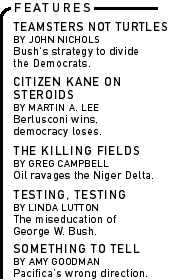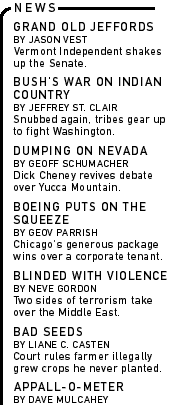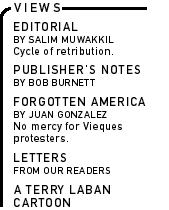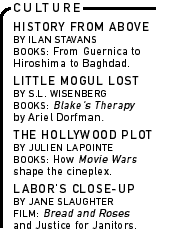

|

|

|

|
|
|
| |
|
|
|
Democracy Now! is facing very serious pressure. I was called to Washington in September and met with the general managers of all the stations, who raised concerns about the program. For example, they questioned my insistence on talking about the graphic details of police brutality before listeners have had their morning coffee. I replied that we should be more concerned about the police brutality that was taking place than what time our listeners heard about it. The station managers asked why I went up to Spike Lee during the Gore-Bradley debate and asked him what he thought about the students around the country who were taking over administration buildings, protesting that their college sweatshirts were being made in sweatshops. He said he applauded their right to protest. Then I asked how he justifies being a spokesman for Nike? They weren't pleased with this. I mean, it makes sense that Spike Lee wouldn't be happy, but the general managers of the Pacifica stations? They wanted to know why I found it necessary to go up to former President George Bush at the Republican Convention and ask him what he says to those who call him a war criminal for dropping bombs on Iraq. Their criticism concerns me gravely, because the kinds of issues we deal with every day are police brutality, the prison-industrial complex, giving voice to the anti-sweatshop movement, showing how important it is to go up to those in power and hold them accountable. Of course, it's not only Pacifica that has criticized me. I recently went to the news conference of former Nebraska Sen. Bob Kerrey, which he was forced to hold because the New York Times and CBS were coming out with a story that what he won the Bronze Star for in Vietnam was in fact a massacre of women and children in the Mekong Delta more than 30 years ago. I think he was leaking the story first to cut down on the criticism and to be able to frame it himself. The following exchange occurred between Kerrey and me: Me: It's not just people like you who pull the trigger and kill civilians who bear different levels of responsibility. What do you think of setting up a war crimes tribunal that would bring people, perhaps like you, but more importantly, the architects, like Henry Kissinger, before it, and then the decision would be made about whether this was a war crime or not. Kerrey: Again, it's your--your--I just--I'm not prepared to talk about where I'm going to go or where this ought to go. I really am not. And I--I--you know, I appreciate ... Me: Well, you've had more than 30 years to think about this. This is a man who has run for president, and who may run for president again. I consider these standard questions to ask someone like Kerrey. The next night, the following exchange occurred on Fox Special Report With Brit Hume: Hume: What about that question and what about the general behavior of our colleagues in that news conference? Mara Liason (National Public Radio reporter): I don't think this kind of press conference would have happened if he was in Washington. ... I don't know if those people have worked for any publications. I don't know if they really were journalists. They were clearly interested in reliving the war and the anti-war movement. The following night on the same show, Roll Call's Morton Kondracke weighed in: "This struck me as a little left-wing cabal. I don't know who those reporters were, especially the woman." As did his partner in punditry, the Weekly Standard's Fred Barnes: "This is a left-wing attack to make sure that people continue to regard ... the Vietnam War as wrong." What I was doing was trying to depersonalize it from Kerrey and to look at the overall U.S. foreign policy issue of war crimes. War crimes tribunals are being set up in different places in the world, but what about right here in the United States, which is so often the country that provides the weapons that allow these massacres to take place, whether in Vietnam, Indonesia, East Timor, Guatemala or El Salvador? These are the issues that the independent media have raised for years, and we must continue to raise them. We must fight against the commercialization of the media and--no matter how many channels are out there--the concentration of ownership of the media. We know where commercial broadcasting is, but I'm concerned about public broadcasting in general. You have Noggin, the joint project of Children's Television Workshop and Nickelodeon, a for-profit company, conducting market research on students in public schools. Last year a public elementary school was given thousands of dollars by Noggin--the school loves the money and the caché of working with people from the Children's Television Workshop. Experts came in and asked the children to fill out a 27-page booklet called "My All About Me Journal." It sounds innocent and wonderful enough, yet this can be used for marketing research. Or, look at some of the documentaries that PBS has accepted and some of the documentaries that PBS has rejected, according to FAIR. Rejected by PBS: Defending Our Lives, an Academy Award-winning documentary about domestic violence. Why rejected? One of the producers was the leader of a battered women's support group, and PBS felt that gave her a direct, vested interest in the subject matter of the program. What was distributed by PBS? The Prize: The Epic Quest for Oil Money and Power, a series funded by Paine-Webber, a company with significant oil interests. The series' chief analyst was Daniel Yergin, a consultant to major oil companies. Almost every expert featured in the program was a defender of the oil industry. Then you had a documentary Out at Work, a film about workplace discrimination against gays and lesbians. Why did PBS reject it? Because it was partially funded by unions and a lesbian group. PBS acknowledged that the underwriters had clearly not controlled the program's content and that it was compelling TV, responsibly done, but still refused to distribute the film. What did they accept? Living Against the Odds, a special on risk assessment that asserted, "We have to stop pointing the finger at industry for every environmental hazard." That program was funded by Chevron. At Democracy Now! we exposed Chevron's involvement in the killing of two Nigerian activists who had come, along with a whole village, to a Chevron barge to protest another oil spill. Chevron flew in the Nigerian military and the notorious mobile police known as the "Kill 'n Go," who opened fire and killed two of the villagers. There is now a lawsuit in court in San Francisco, which the judge has just ruled can move forward, against Chevron on behalf of the family members of those who were killed. I am also gravely concerned that four years ago, when Democracy Now! started airing the commentaries of Mumia Abu-Jamal, we were pulled off of 12 public radio stations in Pennsylvania that were run by Temple University, and we were their most successful program. They said it was "inappropriate" to air Abu-Jamal's voice. My response is that we're not entertainers, we're reporters. We bring listeners the voices of the popular and the unpopular. We go to where the silence is and we say something. It's absolutely critical during this time of privatization of prisons that while prisons are still largely public, we be the media watchdogs and help the people who are behind bars and on the controversial Death Rows of this country to speak out. I am concerned that Pacifica, the only nationally broadcast independent
media network, is taking a turn in the wrong direction. Pacifica
was born more than 50 years ago in Berkeley, California, started
by a man named Lou Hill who felt that there had to be a media outlet
that was not run by corporations. He had come out of jail after
World War II for refusing to fight. He said that since the media
were run by corporations that provide the drum beat for war because
war is profitable, you had to have a media outlet that is independent,
run by journalists and artists. As George Gerbner, founder of the
Cultural Environment Movement, put it, "corporations have nothing
to tell and everything to sell." Amy Goodman is the host of the Pacifica radio network's Democracy Now! This essay was adapted from her keynote address at the Project Censored awards ceremony, which was held in April in San Francisco.
|

